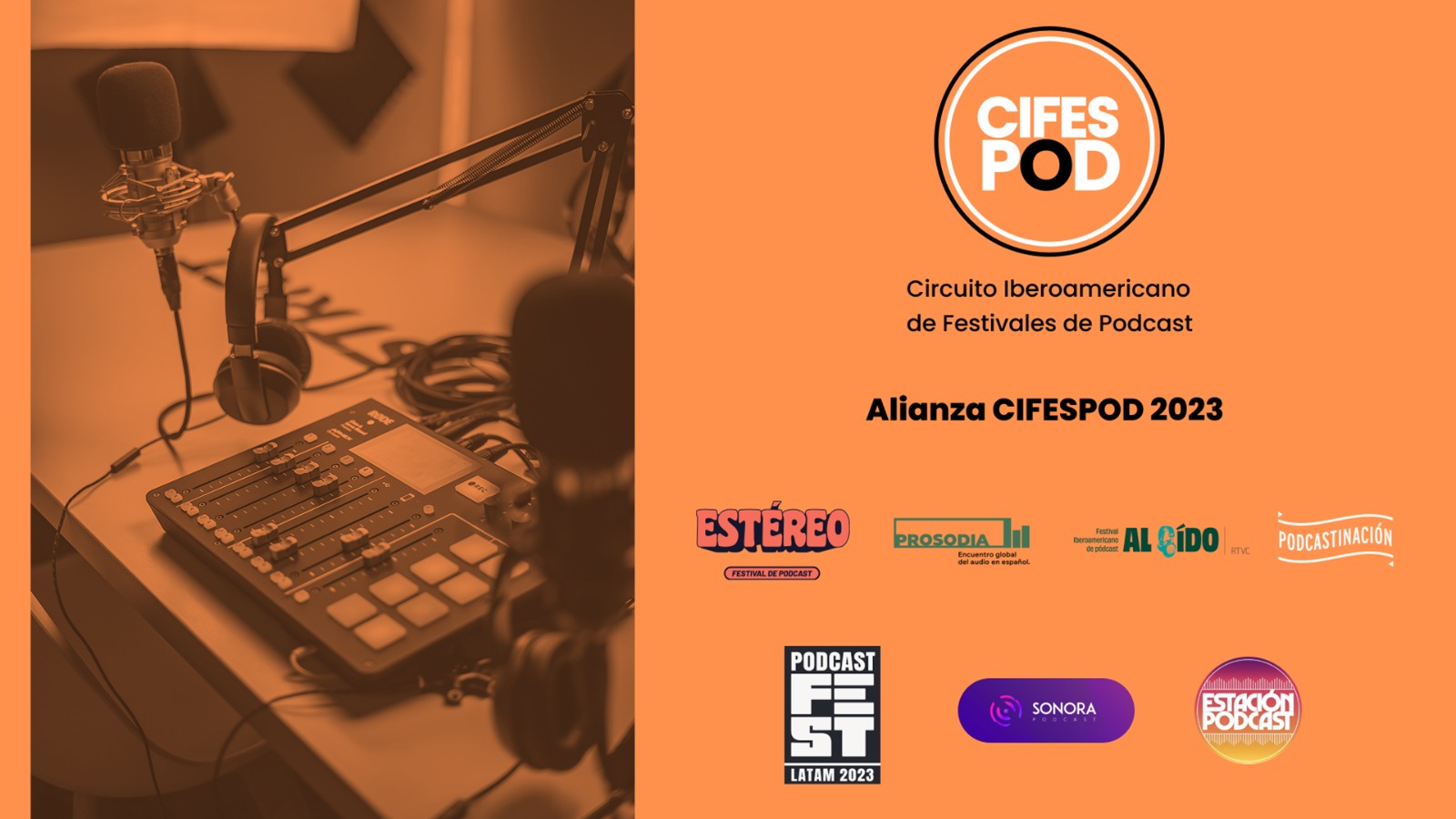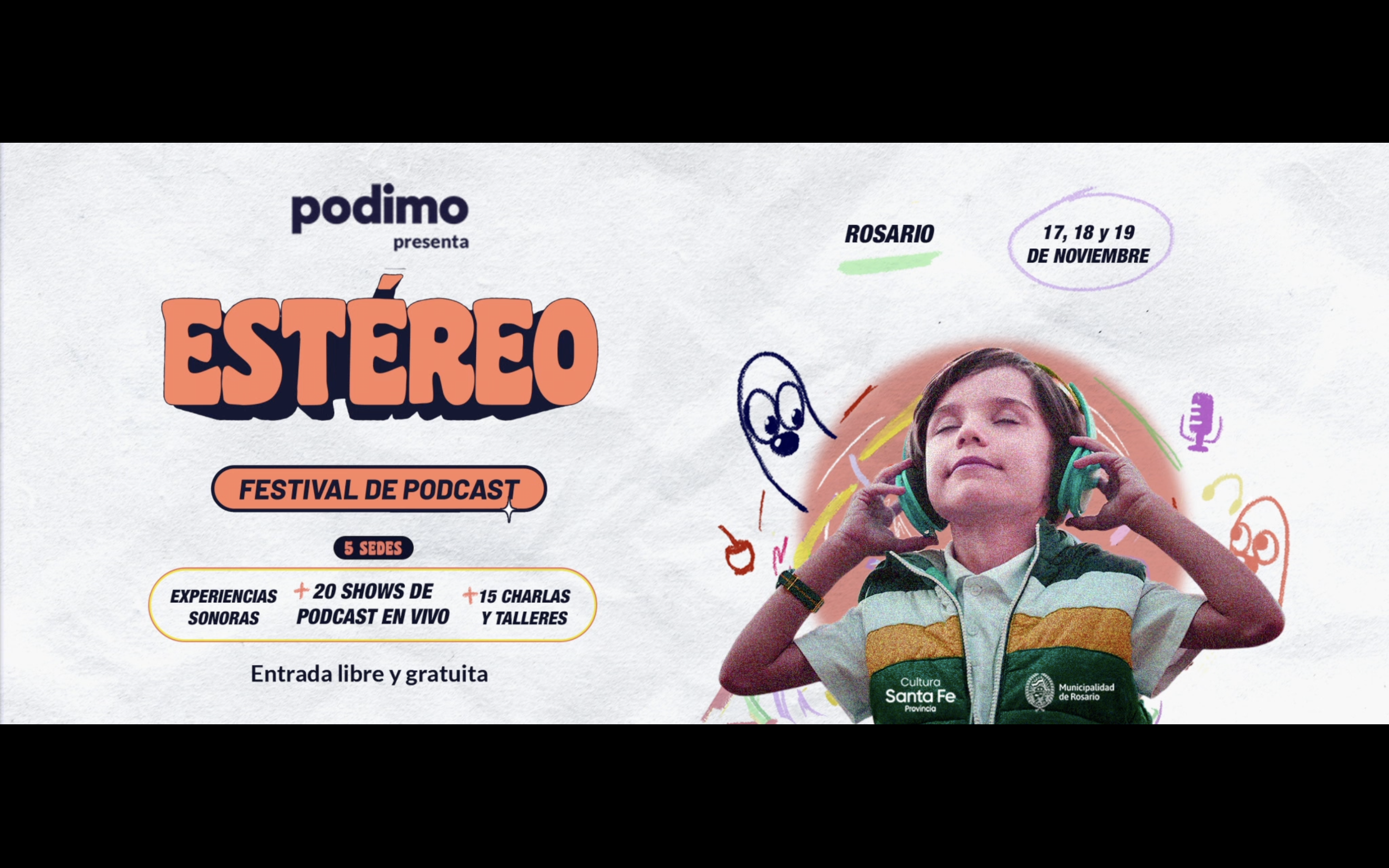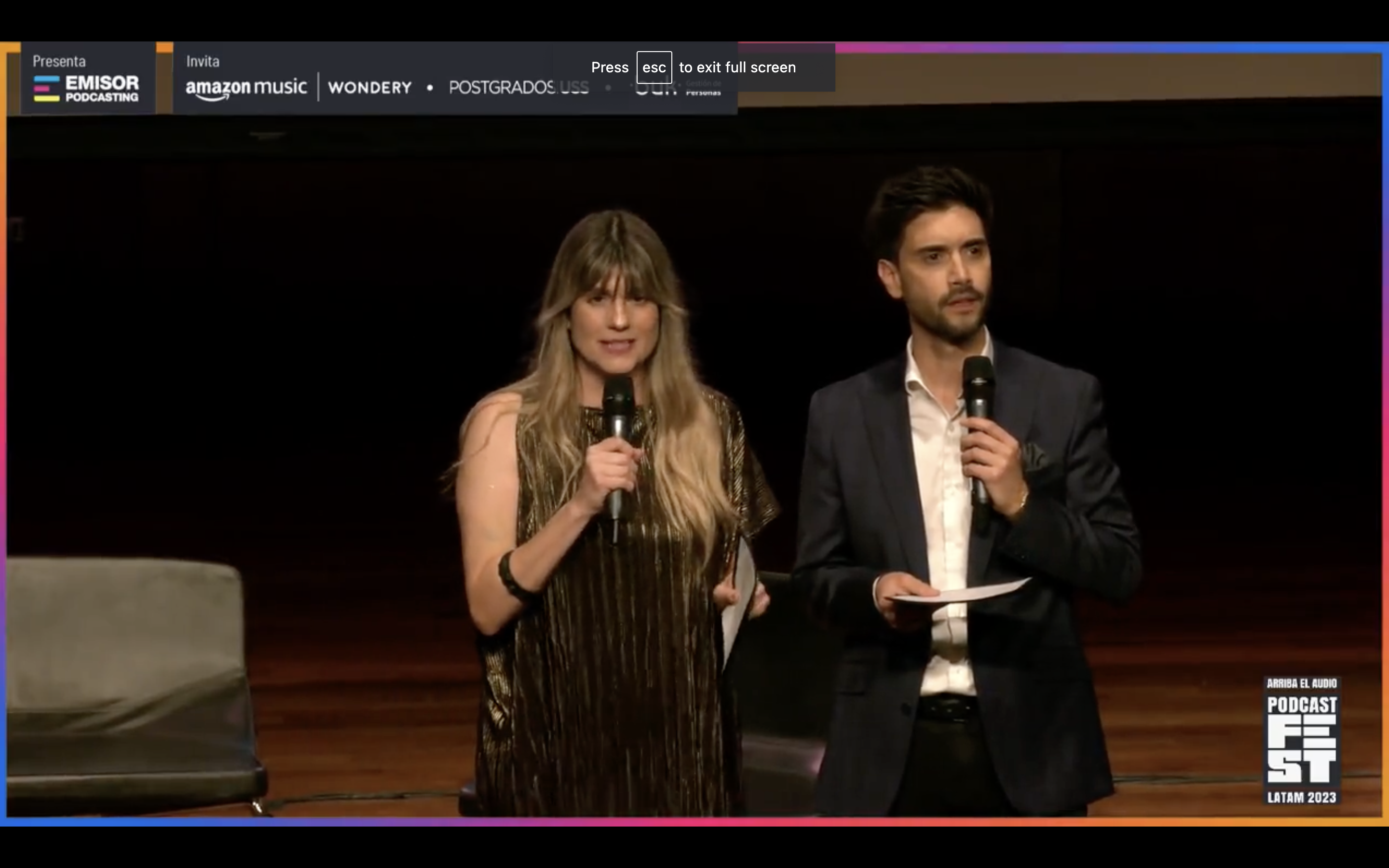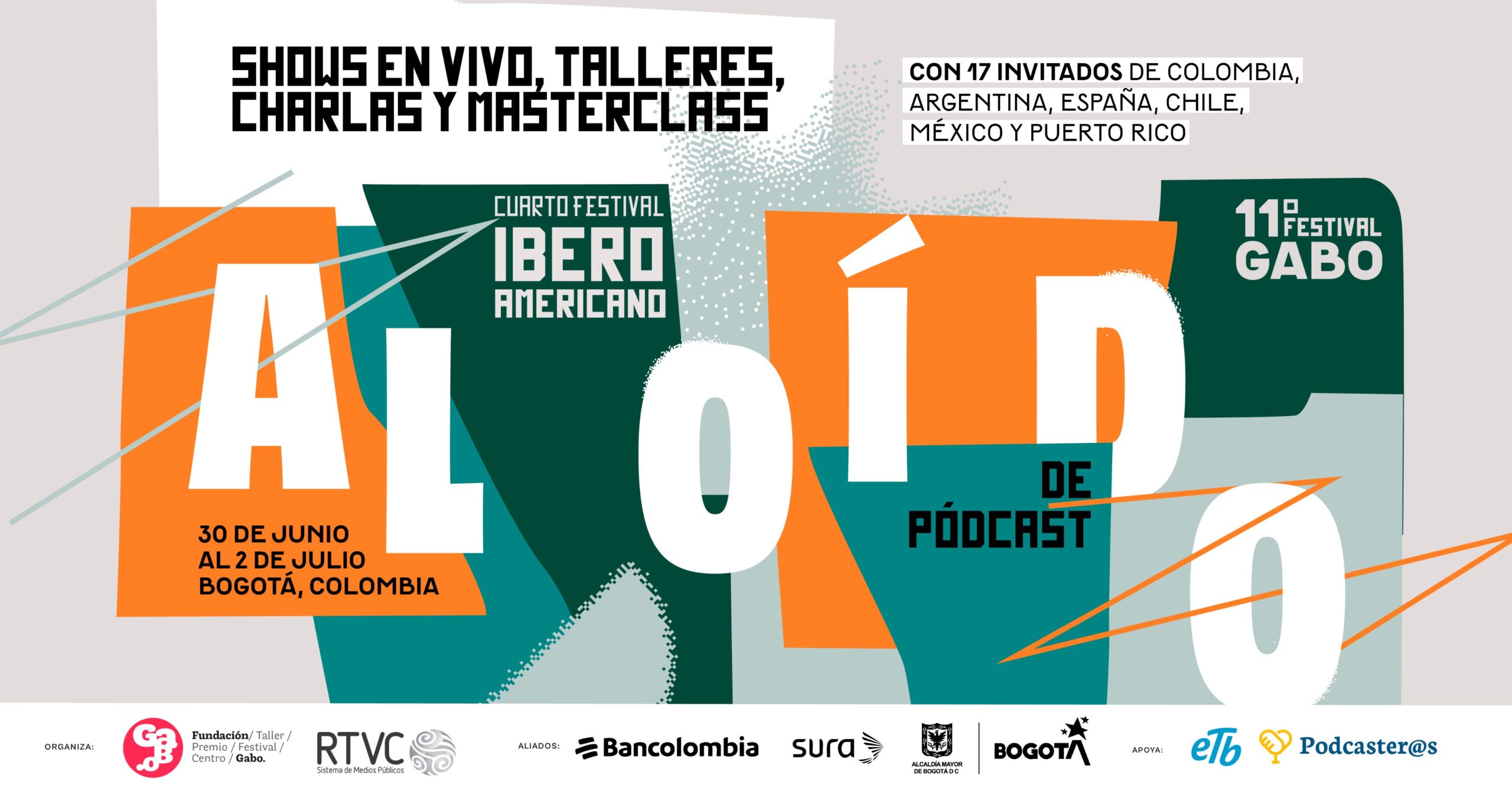The first edition of Estéreo - Festival de Podcast, in Rosario, Argentina, was launched in less than three months. The organizers had no previous experience producing this kind of event. Although the festival, held in November 2022, was a success, the event's directors, Martín Parodi and Federico Rusconi, thought it would be good to have a support network in which different podcast festivals of the region could collaborate with each other and join forces to promote the format.
The prize awarded a month earlier at the Gabo Festival to the podcast "La Segunda Muerte del Dios Punk" (The second death of the punk god) by Argentine journalist Nicolás Maggi and produced by Erre Podcast, a production company led by Parodi and Rusconi, was another important push to seek out other enthusiasts of Latin American podcasts to try to find a relevant place for this format in the culture of Spanish-speaking countries..
The idea of creating the Ibero-American Circuit of Podcast Festivals (CIFESPOD, by its Spanish acronym) came from there. Less than six months later, this circuit was formally comprised by Estéreo and six other festivals: Podcast Fest LatAm (Chile); Al Oído and Podcastinación (Colombia); Sonora, (Uruguay); and, finally, Prosodia and Estación Podcast, (Spain).

Podcast festivals from Argentina, Chile, Colombia, Spain and Uruguay make up the Ibero-American Podcast Festival Circuit. (Photo: Courtesy of CIFESPOD)
"Podcasting is still not seen as a legitimate cultural industry. It seems to me that in other countries it is more consolidated, as in the United States or in some places in Europe as well, but we believe that in Latin America it’s still finding its place. We need to be recognized as such, as an industry of its own, with its own rules, styles, genres, [and] production systems," Parodi, general director of Estéreo, told LatAm Journalism Review (LJR). "When looking for recognition, it seems that coming together makes us much stronger."
Although CIFESPOD is still in the administrative and legal formation stage, it has already outlined some preliminary goals. Among them are promoting member festivals, organizing joint activities, exchanging experiences and information, establishing contact with cultural entities in each country, and searching for funds and subsidies for the production of podcasts.
Circuit members know that, in order to achieve most of these goals, they need the support of different sectors and institutions. And to achieve that, it is essential for podcasts to be recognized as a cultural industry.
"We need first to get very organized among ourselves, to have a super smooth schedule, to see how we can collaborate," Parodi said. "We’re very clear that we need to talk to the cultural secretariats of the different countries, because that is the way forward. Institutional support is needed and that's why we need to have recognition as a cultural industry with its own identity."
A festival alliance would also have a positive impact when searching for financial support and subsidies for the podcasting industry, according to Juan Carlos Baquero, director of RTVCPlay, Colombia's public media streaming platform, which organizes the Ibero-American Podcast Festival Al Oído.
To potential funders, Baquero said, CIFESPOD will offer not only a festival’s local audience, but the sum total of several audiences in various parts of Ibero-America.
"I feel it's a 'win-win' for everyone. I think this is a way to be stronger, to be able to guarantee growth and also offer our users and our followers more solid, more cohesive and more enriching offerings," Baquero told LJR.
The exchange of ideas and insights among creators that happens during podcast festivals is a very enriching experience, according to Ignacio Lara, director of Emisor Podcasting, the production company behind Podcast Fest Latam, in Chile.

The first edition of Estéreo - Festival de Podcast took place in November 2022. Less than a year later, the event formed CIFESPOD. (Photo: Courtesy of Estéreo - Festival de Podcast)
If this type of exchange were to take place among festivals, he said, it would give them a clearer vision of where the audio industry is heading in different countries, so that concrete actions might be taken to strengthen podcasting at all stages of production.
"We [the festivals] are more or less facing a similar struggle. It has to do with establishing this format, raising its production, exhibition level every day and, obviously, also the marketing, for this to become a profitable and attractive business," Lara told LJR. "It’s because we like this format and we believe in it. What better way forward than to be able to talk, especially among countries, about how we are producing and creating audio in our different countries."
Among other actions items member festivals of the alliance intend to carry out are sharing their know-how on how to produce a podcast festival from scratch. This would spur the creation of more such spaces in other countries in the region and eventually add new members to CIFESPOD. They also seek to consolidate a circuit in the style of film circuits, in which outstanding podcasts from one country could more easily be presented at festivals in other countries, thus increasing their impact.
But CIFESPOD's greatest goal mid-term is to establish an Ibero-American award, similar to the Ondas Globales del Podcast awards in Spain, but based in Latin America. According to Parodi, this award for best podcast production would seek to honor the region's non-fiction sound journalism.
"To have a version of these awards in Latin America would be very valuable, because we would be playing local. To create an itinerant award that changes countries every year could be very interesting," he said. "It seems to us that this is the missing leg to finish consolidating it [as an industry]. Our idea is, obviously, to put non-fiction podcasting, journalistic and documentary podcasting up high. We think that has to be the Grand Prize."
Colombia's Al Oído festival, which emerged in 2020 as an online event, will for the second consecutive year have an on-site part during the Gabo Festival, from June 30 to July 2, 2023. This alliance with the iconic festival of the foundation of the same name — which in its 2022 edition added Audio as a category of its awards for the best of Ibero-American journalism — is helping to make visible and strengthen narrative non-fiction podcast productions.
"[Podcasting] is a technology that, due to its characteristics, has facilitated forms of consumption that have been a breath of fresh air, have reopened a space for a certain type of journalism. I mean sophisticated journalism, 'artisanal' journalism, literary journalism, investigative journalism, which was running out of space in other sound expressions," Baquero said. “The fact that the Gabo Foundation came to endorse and open a space for this format is essential.”
The triumph of "La Segunda Muerte del Dios Punk" with the first Gabo Award in the Audio category legitimized the podcast as a valid format in which to produce journalism, in the opinion of its creators. But it also represented the opening of many doors for Latin American journalists looking for spaces to publicize long-range investigative work.

Podcast Fest Latam, organized by Emisor Podcasting, has been held every year in Chile since 2020. (Photo: Screenshot)
"As a result of this [the award], there are journalists who approach us differently saying they would like to transform an investigation they have into a podcast. Or a very long article, or a book of investigative journalism," Parodi said. "That portability that podcasting gives journalism, I think it can be a very interesting channel to bring deep and very complex and important research to other audiences.”
In this sense, alliances such as the Al Oído Festival and the Gabo Festival, and the festivals that make up CIFESPOD, could help encourage journalists to approach the sound format. The festivals that make up the Circuit have a training component with which — through workshops, panels and master classes — they seek to professionalize the creation of podcasts, especially narrative and non-fiction ones.
"We have talked to prominent people who have done written journalism and who are starting to get hooked on podcasting. They like it, but they don't quite understand how it works. [At festivals] they begin to understand how you can tell stories via sound, which is a very different format than words, and can reach different audiences," Parodi said.
Podcasting has registered remarkable growth in Latin America in recent years. Podcast listening time in Spanish doubled in 2022 compared to the previous year, according to the latest iVoox Observatory report. In Mexico, podcast listeners doubled between 2019 and 2022, according to a report by PwC Mexico. While in Colombia, podcast creation increased 47% in 2022, according to Spotify.
With figures like these, the emergence of festivals and events around podcasting in the region seemed a natural step, as a way to take advantage of a growth trend, but also to organize and shape the nascent industry.
"Generally, when there are festivals or awards or institutions behind this, the good thing that happens is that it starts to be much more motivating to work certain formats," Lara said. “I think festivals can absolutely help install those trends and get more people interested in the format.”
In addition to bringing together creators and members of the sound content industry, the festivals that make up CIFESPOD also seek to offer a venue for direct interaction with listeners, through talks, meet-ups and live adaptations of podcasts.
For creators, this interaction is very important to strengthen the sense of community needed for a podcast to become a long-term sustainable project.

For the second consecutive year, Colombia's Al Oído festival will have an in-person sectoin during the Gabo Festival, from June 30 to July 2, 2023. (Photo: Courtesy of Al Oído)
"There are captive communities who do very well relating to content they like and that makes them stay there, because they’re already part of something. The 1.0 communication of sitting and listening to a podcast ends and it starts to transform into a club of friends where you are no longer just giving something, which is your listening time, but you get to be part of a club," Lara said. “Also, as an industry, we read the temperature of what's going on, what we can create, what's moving and that's also very positive.”
Given the growth of Spanish-language digital audio content and the number of listeners consuming it, podcast producers know there is enormous potential to grow as an industry. But they also know that organizing and aggregating these audiences will make for a greater and more sustained growth.
"If each country remains alone with its own public, this will not work. We need integration, we need collaboration, [we need] the amplification [a single] language gives us to be present in several countries with the same content," Lara said. "These festivals have to undergo transformation. Their next steps have to allow for that."